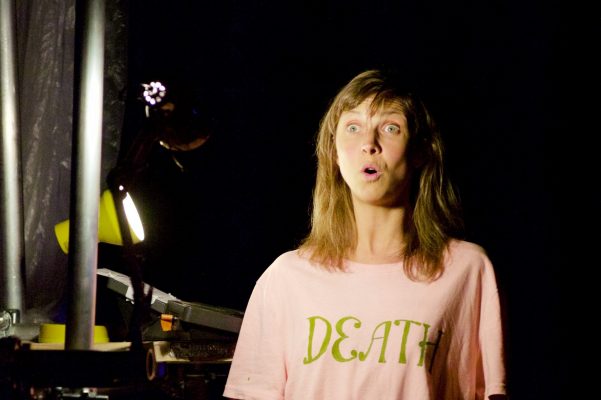Caroline Horton is beautiful, funny, fierce, endearing, intelligent, outspoken, creative, talented, full of life. And she spends a significant portion of her life wanting to die. She has depression. She takes medication. Even when she feels better – when she feels able to get out of bed, get in the shower, face the day with her clean smelling hair – she knows depression will suffocate her again soon. And depression won’t call ahead to warn her.
Part theatre, part performance art, Horton wanted to title her show, All of Me, with the title scored out. Seemingly, this was more than the Fringe machinery could deal with it. So she’s left with a title that promises everything when, in fact, as she points out, she has nothing. Nothing to offer us. Nothing left of herself, for herself. Her mental illness has taken it all.
As befits the subject matter, this show is instantly uncomfortable viewing. Horton begins the show with the house lights up, apologising to the audience that the title is wrong, the material isn’t good enough. She had to cancel last year’s planned show as she was ill and it wasn’t ready – and she’s not sure that what she has in its place is good enough either. Even the set is wrong (It’s a dishevelled masterpiece, courtesy of Eleanor Field). And, she acknowledges, the audience will be instantly uncomfortable as we hate shows that begin with apologies.
Then she tells stories, sings, shouts, grieves, rails against the system that seeks quick fixes, the society that feels queasy at talk of broken heads. Her singing has a Bjork-like quality, particularly when smooshed together with a thudding garage soundtrack. The sound design (Elena Pena) completes the discombobulating effect. It makes for a disjointed show that is more than a little disturbing. An hour and a bit of watching a woman flounder in amongst her “suffering, suffering, smallness and suffering.”
Her script has something of Sarah Kane’s 4:48 Psychosis in it, in her relentless refusal to cover up the soul-destroying debilitating monotony of mental ill-health. It’s a howl of despair at a life half-lived at half -speed for more than half its time. And yet, in among the misery, director Alex Swift and Horton herself have created moments of defiant macabre majesty. Horton, bare-chested, feather head-dressed, a cascading sea of black silk as a skirt, stands astride her set and addresses us as Death. Death trying to lure her into his arms. The brilliance of her show is in making us see his seductive appeal.
This is a brave show that won’t be to everyone’s taste. It doesn’t come with a tidy beginning, middle and end. It doesn’t offer much in the way of hope. “Where are all our gods?” Horton pleads, “We could do with one or two now.” Where she spends the show seeking a purpose for her life, she doesn’t even find that. But dressed in death, bawling for our attention, Horton’s show reminds us that mental illness isn’t a thing we could or should turn our backs on.
